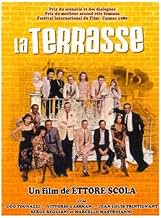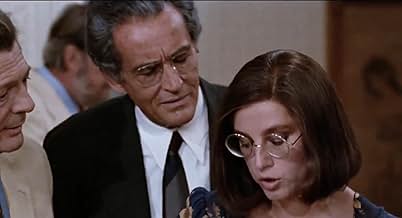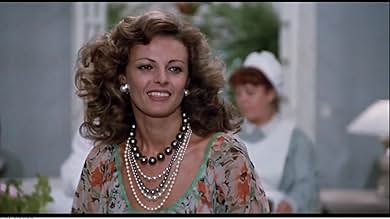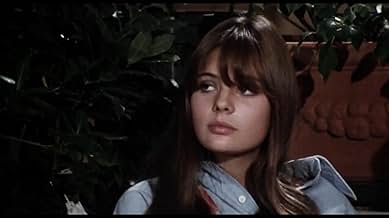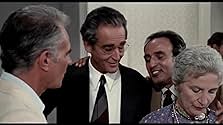Lors d'un dîner sur une terrasse romaine, les vies et les expériences de plusieurs personnages s'entremêlent.Lors d'un dîner sur une terrasse romaine, les vies et les expériences de plusieurs personnages s'entremêlent.Lors d'un dîner sur une terrasse romaine, les vies et les expériences de plusieurs personnages s'entremêlent.
- Réalisation
- Scénario
- Casting principal
- Récompenses
- 5 victoires et 1 nomination au total
Jean-Louis Trintignant
- Enrico D'Orsi
- (as Jean Louis Trintignant)
Agenore Incrocci
- Vittorio
- (as Age)
Leonardo Benvenuti
- Un ospite
- (as Leo Benvenuti)
Avis à la une
Ettore Scola seemed to epitomize Italian cinema in the 70's and early 80's. What great films he did: We All Loved Each Other so much, Ugly Dirty and Bad, A Special Day (for me it's Mastroianni's best), Passion of Love (incredible story of beauty and ugliness), Le Bal, etc. Where directors like Bertolucci and Bellochio seemed to lose their way in political argument, Scola stayed on his feet and created wonderful satires of bourgeois complacency.
The Terrace is too long--almost three hours--and too loaded with characters to have much force. The political and social problems described here seem obscure and distant from us in time. The speech Mario gives to the PCI congress is well done (he's asking for forgiveness for his adultery with Giovanna) but hasn't much dramatic effect. Much better are the little touches: the elderly waiter dragging the wagon over the tile floor, making an awful screeching sound as Luigi and Carla dine; the workmen who reduce the size of Sergio's office in ten seconds flat--wonderful effect; Sergio trying to talk to the head of RAI in the latter's office, with the huge Grecian bust between them, very funny.
I should point out that far too much of the comedy misses its mark and falls flat: I don't know what Scola was trying to do with Enrico's writer's block and the finger in the pencil sharpener. Marie Trintignant appears as eye candy throughout the film and serves no purpose in the story. If you choose to watch this, get ready to hit the fast forward button.
The Terrace is too long--almost three hours--and too loaded with characters to have much force. The political and social problems described here seem obscure and distant from us in time. The speech Mario gives to the PCI congress is well done (he's asking for forgiveness for his adultery with Giovanna) but hasn't much dramatic effect. Much better are the little touches: the elderly waiter dragging the wagon over the tile floor, making an awful screeching sound as Luigi and Carla dine; the workmen who reduce the size of Sergio's office in ten seconds flat--wonderful effect; Sergio trying to talk to the head of RAI in the latter's office, with the huge Grecian bust between them, very funny.
I should point out that far too much of the comedy misses its mark and falls flat: I don't know what Scola was trying to do with Enrico's writer's block and the finger in the pencil sharpener. Marie Trintignant appears as eye candy throughout the film and serves no purpose in the story. If you choose to watch this, get ready to hit the fast forward button.
The movie's status as a cult classic definitely makes sense to me now. It's a very satirical and thorough look at the italian elite of intellectuals and artists, all of them very narcissistic, pretentious, self-pitying, emotionally unstable, in a constant internal state of decay, brandishing political theory without actually applying it, fighting unsuccessfully against the world of the 80s and capitalism and profit. All the main characters are tragic, and their awareness of their own pathetic nature makes them even more unhappy. They're all men who use women or demand their attention and their love, they try to find happiness where it doesn't belong. The theme of the movie is the humorous existential loneliness of the self-aware bourgeoisie. I have some complaints, like the fact that the movie is a bit long for my taste, and some of the 5 episodes really drag. The actors are almost all pretty good, the final raging monologue of Mario is amazing. The humor holds up pretty well, and it's always interesting to see how an older generation of creatives saw themselves. Overall, not very digestible, but fine as an intellectual and thought provoking portrait of the 80s artlife.
10beto-19
Adorable, intelligent and politic driven movie. The best Italian director ever commands great actors and conducts the audience through a journey of passionate and bitter fellows who dare to fight for their beliefs.
In La Terrazza there are some amazing speeches - which I don't recall exactly - about every human being's right to happiness and love.
Maybe I liked it so much because I'm already a big fan of Ettore Scola. I also recommend his masterpieces "C'eravamo Tanto Amati" (the best Victorio Gassman performance) and "La Cena" (the last Gassman appearance).
In La Terrazza there are some amazing speeches - which I don't recall exactly - about every human being's right to happiness and love.
Maybe I liked it so much because I'm already a big fan of Ettore Scola. I also recommend his masterpieces "C'eravamo Tanto Amati" (the best Victorio Gassman performance) and "La Cena" (the last Gassman appearance).
Horrible sound, horrible photography, horrible screenplay, horrible acting. It seems to be directed with the left foot. Miles and miles away from the masterpieces 'C'eravamo tanto amati' or 'Una giornata particolare'.
Too much ambitious as well as superficial. It tries to represent the moral and political defeat of a generation, but the characters are two-dimensional.
Very uncertain in the choice of style: naturalistic or grotesque? It would have been better to go with the grotesque, because this kind of naturalism is very depressing. Scola used a bunch of actors who have always played anti-naturalistic characters in the glorious years of Italian cinema, so they are poorly utilized.
I'm sure this film will be forgotten over time.
Too much ambitious as well as superficial. It tries to represent the moral and political defeat of a generation, but the characters are two-dimensional.
Very uncertain in the choice of style: naturalistic or grotesque? It would have been better to go with the grotesque, because this kind of naturalism is very depressing. Scola used a bunch of actors who have always played anti-naturalistic characters in the glorious years of Italian cinema, so they are poorly utilized.
I'm sure this film will be forgotten over time.
"During the dinner sequences, it is like operating an ensemble piece on a dime, DP. De Santis adroitly interposes long takes among various characters, discreetly listens to their conversations, or follows the kerfuffles, but there are no Altmanesque flourishes, which can concatenate all the fluid movements into a delectable visual orchestra. Here, Scala is more keen on building the signs of the times than showing off his sleight of hand, and juggling between studio and location shooting, LA TERRAZZA is an oddity that looks old school but attempts to say something au courant (the self-reflection of a society burdened with bureaucracy, commercialism and hypocrisy), therefore, it feels often luxuriate in the inner circles' own woes and melancholia. It is so cruel to see Mastroianni's Luigi the journalist, gets a cold shoulder from a young girl, the erstwhile Italian dreamboat now has been reduced to a gabby uncle figure that is so detached from the younger generation (a metaphor of Italian cinema's glorious days are on the ineluctable wane)."
keep reading my review on my blog: cinema omnivore, thanks
keep reading my review on my blog: cinema omnivore, thanks
Le saviez-vous
- AnecdotesSerge Reggiani's character in the movie Is producing a TV adaptation of Théopile Gautier's famous novel "The Captain Fracasse";10 years later, director Ettore Scola will make a movie adaptation of the same novel, titled "CAPTAIN FRACASSA'S JOURNEY"
- Citations
[repeated line]
Hostess at 15° PCI's Congress: Dinner is served. Come!
- ConnexionsFeatured in La strana coppia. Incontro con Age e Scarpelli (2001)
- Bandes originalesConcerto N.8 in La Minore
by Antonio Vivaldi
Meilleurs choix
Connectez-vous pour évaluer et suivre la liste de favoris afin de recevoir des recommandations personnalisées
- How long is La terrazza?Alimenté par Alexa
Détails
- Date de sortie
- Pays d’origine
- Langue
- Aussi connu sous le nom de
- Die Terrasse
- Lieux de tournage
- Foro Piscario, Via della Tribuna di Campitelli, Rome, Lazio, Italie(Mario and Giovanna in the ruins of a Roman monument)
- Sociétés de production
- Voir plus de crédits d'entreprise sur IMDbPro
- Durée
- 2h 30min(150 min)
- Mixage
- Rapport de forme
- 1.85 : 1
Contribuer à cette page
Suggérer une modification ou ajouter du contenu manquant

